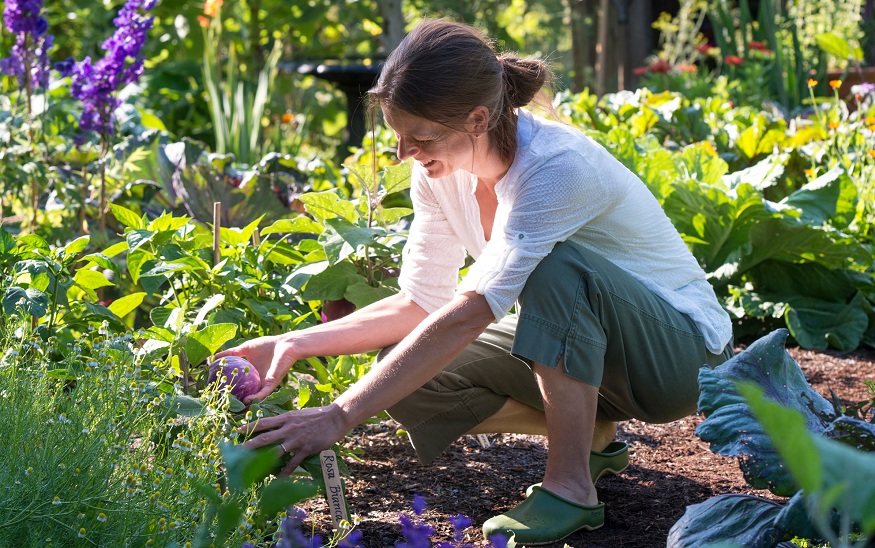If you want to know where it’s hot and dry, look at this west-facing Seattle garden (by Tim Moshier of Cambium Landscape). The plants love the sun. Photographs by Debra Prinzing.
In the West, gardeners have the unique benefit of not having to follow many rules about how to plan and grow their plants. We appreciate and adapt to our garden’s setting and cultural conditions. There are so many healthy and suitable trees, shrubs, perennials, annuals, vines, bulbs, and groundcovers that we can choose from that it can be overwhelming, but most people don’t complain!
We’re very lucky to live in the Pacific Northwest, where the weather is mild and never too hot or cold. This welcoming, plantfriendly climate bestows added blessings. (Just think about how hard it was to put together a regional gardening book with only 186 great plants!) Maybe we need to be more disciplined with our gardening habits. You can be sure that we want to take good care of our gardens so that we can enjoy them now and in the future.
As an amateur gardener, I’m always looking for ways to up my game and become a truly great green thumb. After years of trial and error, I’ve learned a few key practices that can help any gardener succeed. Here are my top 10 tips for becoming a good, knowledgeable gardener:
1. Learn Your Garden’s Growing Conditions
Get to know your garden! Pay attention to sunlight, shade, wind exposure, and soil type. This will tell you which plants will thrive in different areas. For example, if you have acidic soil, grow acid-loving plants like hydrangeas and blueberries.
2. Start Plants From Seed
This saves money and teaches propagation skills. With practice you can grow any vegetable or flower from seed. Starting seeds indoors gives you a head start on the growing season. See your tomatoes? You grew them yourself – that’s satisfying!
3. Feed and Water Consistently
Plants need food and water to live, just like us! Apply balanced fertilizer every 2-4 weeks during growing season. For water, aim for deep weekly soakings rather than frequent sprinkles
4. Plan Out Your Garden
Don’t just buy random plants! Sketch out beds, borders, and pots Consider height, color, and blooming seasons for aesthetics Planning prevents jumbled, mismatched gardens.
5. Prune Shrubs and Trees
Pruning neatens up plants and promotes healthy growth. It seems intimidating but there are simple rules to follow. Learn proper techniques for your garden’s trees and shrubs. Pruning is like giving your plants a haircut!
6. Divide Overgrown Perennials
Dividing creates more plants for free! But you need to know which perennials can be divided and when to divide them. Do your research before hacking away with a shovel.
7. Compost Kitchen and Garden Waste
Composting reduces waste while making free “black gold” for your garden. Toss leaves, trimmings, food scraps into a pile or bin. In a year, you’ll have nutritious compost to mix into beds.
8. Mix in Organic Matter
Digging in compost, manure, leaves etc. improves any soil. Breaking up compacted earth helps roots grow. Take time to prepare your soil before planting.
9. Control Pests Naturally
Tolerate minor pest damage, but intervene if populations explode. Pick off slugs and snails by hand or use organic methods like neem oil. Avoid toxic chemicals that harm beneficial insects.
10. Take Classes and Go on Garden Tours
Continuing education makes a great gardener! Attend lectures at garden clubs and flower shows. Chat with experienced gardeners on tours. Bring a notebook, ask questions, and apply what you learn.
READ THE WHOLE STORY
Enjoy this article for FREE:
If you are already a member, please log in using the form below. Username or E-mail Password Remember Me.
Gardening 101: How To Start A Garden
FAQ
What makes a professional gardener?
What makes a successful gardener?
Resilience is a crucial trait of that successful gardener. And aside from finding ways to improve their garden and the health of their plants, gardening is also about self-discipline. Resilience means that gardeners who start a garden stick with it no matter the weather, climate, challenge, or situation.
How to be a good gardener?
To know how to be a good gardener and what skills are necessary for great gardening, you don’t need a complex guidebook. Start by creating a game plan and preparing with patience. Assemble the tools, including soils, pruning shears, and digging accessories. Of course, seeds are also an obvious requirement.
How do I find a good gardener?
Heinrich says social media is the best place to find gardening professionals. YouTube, Instagram, and Facebook are all excellent resources to find experts who will give new gardeners great (and free!) tips to get started. Before you start your gardening project, you need to get the proper gardening tools and gear.
Is gardening for beginners a good idea?
Melvin Cubian, a certified botanist and gardening expert for the PlantIn App, says that while gardening for beginners can be challenging, you can increase your chance of success by opting for simple plants whose cultivation methods are not laborious or time-consuming.
- The Ultimate Guide to Growing Strawberries in Raised Beds - August 8, 2025
- No-Dig Garden Beds: The Easiest Way to Grow a Beautiful Garden - August 6, 2025
- How to Protect and Preserve Wood for Raised Garden Beds - August 6, 2025

